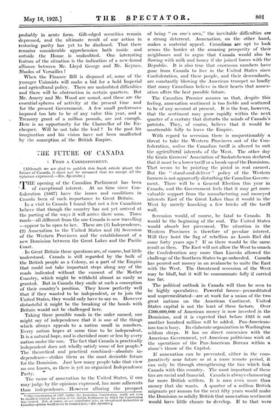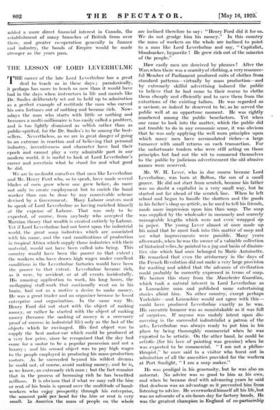THE FUTURE OF CANADA
!.0 FROM A CORRESPONDENT.
[Although we are glad to publish this, frank article about the future of Canada, it must not be assumed that we accept all the opinions expressed•—ED. Spectator.] TIME opening of the Canadian Parliament has been 11 of exceptional interest. At no time since Con- federation (1867) have the issues and conditions in Canada been of such importance to Great Britain.
• In a visit to Canada I found that not a few Canadians believe that though the country has not yet arrived at the parting of .the ways it will arrive there soon. Three roads—all different from the one .Canada is now travelling —appear to be open to her. These are (1) Independence, (2) Annexation to the United States and (3) Secession of the Western Provinces and the establishment of a new Dominion between the Great Lakes and the Pacific Coast. .
, In Great Britain these questions are, of course, but little understood. Canada is still regarded by the bulk of the British people as a. Colony, as a part of the Empire that could not take important steps along any of the roads indicated without the consent of the Mother Country, which might be withheld almost as easily as granted. But in Canada they smile at such a conception of their country's position. They know perfectly well that if they wanted to be independent, or to join the United States, they would only have to say so. However distasteful it might be the breaking of the bonds with Britain -would not be challenged here.
Taking 'these possible roads in the order named, one might say of independence that it is one of the things which always appeals to a nation small in numbers.
Every nation hopes at some time to be independent. It is a natural hope, and is cherished more or less by every nation under the sun. The fact that Canada is practically independent does not wholly satisfy some of her people.* The theoretical and practical combined—absolute in- dependence—strikes them as the most desirable future for the Dominion. Just how many people take that view no one knows, as there is yet no organized Independence Party. The cause of annexation to the United States, if one may judge by the opinions expressed, has more adherents than independence... However alluring the prospect "* [The Constitution of 1867, unlike the Australian Constitution, could not even be modified without the action of the British Parliament by which the Constitution was created. But, of course, as our contributor says, an unequivocal declaration of Canadian opinion woulil never be resisted here.--Ym. Specfalor.1 of being " on one's own," the inevitable difficulties are a strong deterrent. Annexation, on the other hand, makes a material appeal. Canadians are apt to look across the border at the amazing prosperity of their neighbours and to argue that Canada would also be flowing with milk and honey if she joined forces with the Republic. It is also true that enormous numbers have gone from Canada to live in the United States since Confederation, and these people, and their descendants, are constantly blowing the American trumpet so loudly that many Canadians believe in their hearts that annex- ation offers the best possible future.
The Canadian Premier assures us that, despite this feeling, annexation sentiment is too feeble and scattered to be of any account at present. • It is the fear, however, that the sentiment may grow rapidly within the next quarter of a century that disturbs the minds of Canada's patriots. They, of course, believe that it would be unutterable folly to leave the Empire.
With regard to secession there is unquestionably a threat to take the Western Provinces out of the Con- federation, unless the •Canadian tariff is altered to suit the agricultural interests of the West. The other day the Grain Growers' Asgociation of Saskatchewan declared that it must be a lower tariff or a break-up of the Dominion.
That Seems to be pointing the pistol in real earnest. But the " stand-and-deliver ?' policy of the Western farmers is not apparently disturbing the Canadian Govern- ment. There will be a General Election this year in Canada, and the Government feels that it may get more valuable support from the manufacturing and moneyed interests East of the Great Lakes than it would in the West by merely knocking a few bricks off the tariff wall.
Secession would, of course, be fatal to Canada. It would be the beginning of the end. The United States would absorb her piecemeal. The situation in the Western Provinces is therefore of peculiar interest. Will they hoist the flag of rebellion as Louis Riel did some forty years ago ? If so there would be the same result as then. The East will not allow the West to smash the Confederation any more than Lincoln allowed the challenge of the Southern States to go unheeded. Canada has poured out money in an avalanche to unite the East with the West. The threatened secession of the West may be bluff, but it will be consummate folly if carried too far.
The political outlook in Canada will thus be seen to be highly speculative. Powerful forces—premeditated and unpremeditated—are at work for a union of the two great nations on the American Continent. United States capital is not the least of these factors. Over 1500,000,000 of American money is now invested in the Dominion, and it is expected that before 1925 is out another hundred million will be added. Pan-American- ism too is busy. Its elaborate organization in Washington seldom sleeps. It has no direct connexion with the American Government, yet American politicians wink at the operations of the Pan-American Bureau within a stone's throw of the Capitol.
If annexation can be prevented, either in the com- paratively near future or at a more remote period, it can only be through strengthening the tics which link Canada with this country. The most important of these ties are racial and financial. Canada is always clamouring for more British settlers. It is men even more than money that she wants. A quarter of a million British migrants per annum for the next fifty years would make the Dominion so solidly British that annexation sentiment would have little chance to develop. If to that were added a more direct financial interest in Canada, the establishment of many branches of British firms over there, and greater co-operation generally in finance and industry, the bonds of Empire would be made stronger as the years pass.











































 Previous page
Previous page